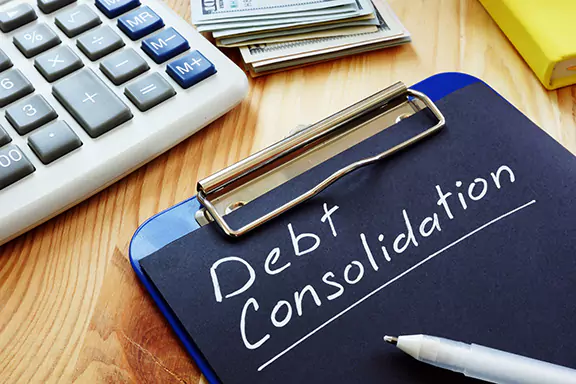Debt consolidation is a popular strategy for managing credit card debt and other types of loans. By combining multiple debts into one single payment, debt consolidation can simplify your financial life, lower your interest rates, and help you pay off what you owe faster.
However, one common question people have is, “Does debt consolidation close your credit cards?” Understanding how debt consolidation affects your credit card accounts is crucial before making any decisions.
We’ll cover how debt consolidation works, what happens to your credit cards during the process, and provide tips for managing your credit card balance and accounts effectively.
What is Debt Consolidation?
Debt consolidation is a debt management strategy that combines your outstanding debts into a new loan with a single monthly payment. This method can help you manage credit card debt, personal loans, and other types of unsecured loans. Here are the main ways to consolidate your debt:
Debt Consolidation Loans: These are personal loans specifically designed to pay off multiple debts. They typically offer lower interest rates than credit cards, making them an attractive option. You can get a debt consolidation loan from banks, credit unions, or online lenders.
Balance Transfer Credit Cards: This involves transferring your existing credit card balances to a new credit card with a 0% introductory APR. This can save you money on interest if you pay off the balance before the introductory period ends.
Home Equity Loans: Homeowners can use the equity in their homes to consolidate debt. These loans often have lower interest rates but come with the risk of losing your home if you fail to make payments.
Personal Loans: Unsecured personal loans can be used to consolidate debt. They don’t require collateral but may have higher interest rates compared to secured loans.
Does Debt Consolidation Close Your Credit Cards?
One of the most common questions about debt consolidation is whether it will close your credit card accounts. The simple answer is no, debt consolidation does not automatically close your credit cards. When you consolidate your debt, you are essentially paying off your existing credit card balances with a new loan or a balance transfer with one monthly payment each. Here’s what typically happens:
Accounts Remain Open: After your credit card balances are paid off, the accounts generally remain open. Keeping these accounts open can be beneficial for your credit score because it improves your credit utilization ratio—the amount of credit you’re using compared to your total available credit.
Voluntary Closure: While accounts are not closed automatically, you can choose to close them yourself. This might be a good idea if you’re worried about being tempted to rack up more charges. However, closing accounts can impact your credit score by reducing your available credit and potentially increasing your credit utilization ratio.
Lender Policies: Some lenders may close your account if you’ve transferred the entire balance and have no activity on the card for an extended period. It’s important to check with your credit card issuer about their specific policies.
Credit Score Impact: Keeping your credit cards open with a zero balance can positively impact your credit score. It shows that you have available credit that you’re not using, which can make you appear financially responsible to credit bureaus.
Consider Some Alternatives to Debt Consolidation
If debt consolidation doesn’t seem like the right fit for a personal loan for your financial situation, there are several alternatives to consider:
Debt Management Plans:
How They Work: A debt management plan (DMP) is arranged through a nonprofit credit counseling agency. The agency works with your creditors to negotiate lower interest rates and create a manageable repayment plan. You make a single monthly payment to the agency, which then pays your creditors.
Benefits: DMPs can simplify your payments and reduce the total interest you pay over time. They can also help you avoid the need for a new loan.
Debt Settlement:
How It Works: Debt settlement involves negotiating with your creditors to pay a lump sum that is less than the total amount you owe. This can be done by yourself or through a debt settlement company.
Benefits and Risks: While debt settlement can reduce the total debt, it can negatively impact your credit score and stay on your credit report for seven years. Additionally, forgiven debt may be considered taxable income.
Credit Counseling Services:
How They Work: Credit counseling services provide financial education and advice. They can help you create a budget, understand your debt options, and develop a plan to pay off your debt.
Benefits: Working with a credit counselor can give you personalized guidance and support without taking on new debt.
FREE Help from the Financial Counseling Association of America (FCAA)
EASY Wireless readers can access free credit counseling assessments with the nonprofit group, Financial Counseling Association of America (FCAA).
Looking to Reduce Your Debt?
EASY Wireless has partnered with the Financial Counseling Association of America (FCAA) a non-profit organization to help you reduce your debt and take help you take back control of your finances.
If you want to learn more then check out the link below.
Get Help Reducing Your Debt
- FREE Consultation
- No Sign Up Fee
- No Obligation
Reduce Expenses and Track Your Status with FREE Cell Phone and Data Service with EASY Wireless through the Lifeline Program
Managing debt effectively often involves reducing your monthly expenses. One way to do this is by taking advantage of the Lifeline program, which offers free cell phone and data services to eligible low-income individuals. EASY Wireless participates in this federal assistance program, helping you stay connected without the added cost.
To qualify, you must meet certain income requirements or be enrolled in government assistance programs like Medicaid or SNAP. Applying for the program is straightforward and can be done online through the EASY Wireless website or by visiting an EASY Wireless retail store.
Click to see if you’re eligible for FREE Cell Phone Service from EASY Wireless.

Tips for Successfully Managing Debt Post-Consolidation
Successfully managing your debt after consolidation is crucial to maintaining financial stability and avoiding future debt problems. Here are some practical tips to help you stay on track:
Create and Stick to a Budget: A budget is essential for managing your finances. List all your income and expenses to understand where your money is going. Allocate funds for necessities, debt repayment, and savings. Make sure to stick to your budget to avoid overspending and accumulating new debt.
Avoid Incurring New Debt: One of the biggest risks after consolidating debt is falling back into old spending habits. Avoid using your credit cards for unnecessary purchases. Consider removing your saved credit card information from online shopping sites to reduce temptation.
Build an Emergency Fund: Having an emergency fund can prevent you from relying on credit cards for unexpected expenses. Aim to save at least three to six months’ worth of living expenses. Start small and gradually increase your savings over time.
Stay Motivated and Patient: Paying off debt takes time and discipline. Celebrate small victories along the way to stay motivated. Remember that each payment brings you closer to financial freedom.
By following these tips, you can effectively manage your debt post-consolidation and work towards a debt-free future.
Take the First Steps to Get Out of Debt
Debt consolidation can be an effective strategy for managing and paying off credit card debt. It simplifies your payments, potentially lowers your interest rates, and helps you save money and regain control of your finances.
After consolidating your debt, it’s important to manage your credit card accounts responsibly, explore alternatives if needed, and take advantage of cost-saving programs like the Lifeline program from EASY Wireless. Following practical tips for managing your debt post-consolidation can help you stay on track and avoid falling back into debt.


